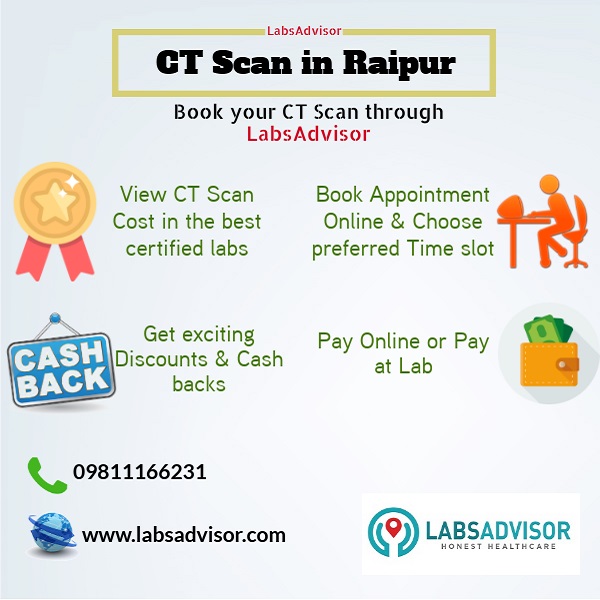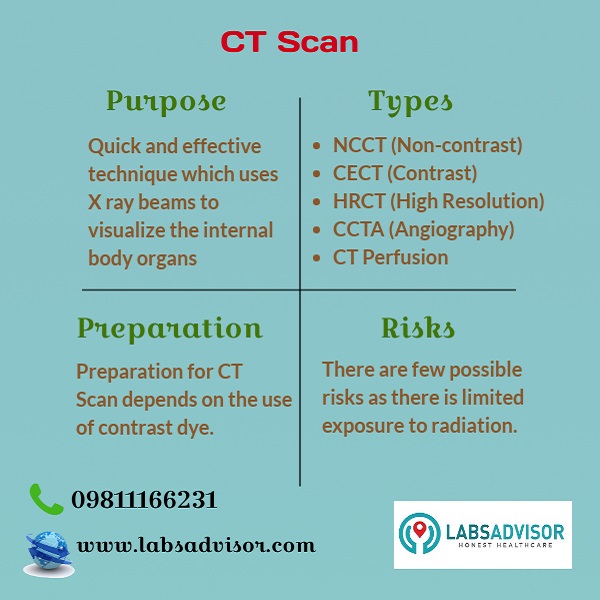Find your CT scan cost in Raipur in all the labs, compare prices and book appointment online with up to 50% discount exclusively through LabsAdvisor – “India’s Largest Online Medical Test Platform.” Served more than 10 lakh happy customers across the country.
CT Scan Cost in Raipur
View all the labs for your CT scan in Raipur and updated prices by clicking on the links as it may vary.
Currently, we are unable to offer CT scan in Raipur. Apologies!
To get a call back from our customer care team, click on the button below.

Frequently Asked Questions About CT Scan
What is a CT Scan?
CT Scan stands for Computed Tomography Scan. It is also referred to as Computed Axial Tomography (CAT Scan). CT Scan helps to visualize the internal organs of the body with the help of X-ray beams and assists the doctors in diagnosing various disorders. CT scan provides a better and detailed image of the body parts compared to the normal X-ray scan. The report of a CT scan can be used for different studies and it can be done on any body part.
Different Types of CT Scan
NCCT / Non-contrast CT Scan
If you have been prescribed an NCCT, it is a normal scan, where your body part is scanned through a CT Scan machine without using any contrast material or dye.
CECT Scan / Contrast-Enhanced CT Scan
Sometimes, the doctor needs better enhanced images for proper assessment. In such cases, a radioactive substance (contrast agent) will be given to the patient either orally or through injection before the scan. CECT scan is generally done to visualize the blood vessels or intestines.
HRCT Scan / High-Resolution CT Scan
HRCT scan produces extremely high resolution images of various body parts. It is especially used to detect lung diseases such as suspected industrial lung disease, lung parenchyma and lung cancer.
CCTA / Coronary Computed Tomography Angiography
Coronary Angiography is a procedure done to examine the arteries that supply blood to the heart to determine whether the arteries have been narrowed by plaque buildup. It is more commonly recommended for scanning the heart and blood vessels.
CT Perfusion Study
CT Perfusion is a study used to look at the blood flow in the brain. For this study, a nuclear agent (contrast) is injected into the patient’s vein to highlight the bloodstream through the brain. This shows the damaged areas of the brain or areas where there is an insufficient blood supply.
Why is a CT scan done?
Your doctor might recommend you to take a CT scan to help him
- Diagnose bone and muscle disorders
- Identify and locate the tumor, infections, blood clot, etc.
- Plan guided biopsy, surgery or radiation therapy
- Examine the internal injuries
- Monitor diseases and conditions like cancer, lung and liver diseases
- Detect the blood vessel abnormalities
- Monitor the success of an ongoing treatment
Generally, a CT scan is done during emergencies to detect and diagnose various disorders in our body as it is very quick and effective compared to other imaging techniques.
Various body parts covered by the CT scan
CT Scan can be done on almost every part of the body such as
- Abdomen
- Pelvis
- Spine
- Chest
- Shoulder
- Brain / Head
- Face
- Neck
- Lungs
- Heart
- Spine
- Knee
- Kidney
- Ureter
- Temporal Bone
- Sacroiliac joint
- Any joint
Is there any preparation before the CT scan?
There is no special preparation required for a CT scan. Also, there are no constraints on diet and you can carry on your regular activities. You are not allowed to carry any item which contains metal content inside the CT scan room. The lab technician will ask you to change into the gown provided in the lab.
In some cases, a contrast dye may be injected to produce more enhanced images of the body part to be examined. This dye may be given orally or injected into the vein. Your doctor will ask you to fast for a certain period and may provide some special instructions if the contrast dye will be used.
How is CT Scan performed?
The CT scan machine looks like a long tube with an X ray attached to it. The lab technician will ask you to lie down on a table which will slide into the CT machine.
The X Ray which is attached to the CT machine rotates around the body part to be examined and captures several images in thin slices. You may hear loud buzzing noises due to the rotation. It is very important to stay still throughout the procedure as it may result in blur or distorted images.
The radiologist will monitor the entire procedure from a different room where the computer is located and will be able to hear and speak to you with the help of microphone and speakers during the procedure.
The entire procedure of a CT scan will take up to 20 to 30 minutes depending on the study and the body part that is examined.
Are there any risks associated with CT scan?
There are very few possible risks in a CT scan. There will be limited exposure to radiation as the CT scan uses X ray beams to produce more enhanced images. This radiation exposure is generally harmless. But on a regular basis, there is a risk of developing cancer overtime.
Generally, it is advised not to take CT scan if you are pregnant or expected to be pregnant as the radiation may harm the fetus.
There are chances of developing allergic reactions due to the use of contrast dye. If you have any kidney disorder, the use of contrast dye may result in kidney failure. So it is very important to inform your doctor about the allergies to contrast dye before the scan.

How long does it take to get the CT scan reports?
The images captured will be stored in an electronic form. The radiologist will analyse the images and then prepares the report.
The results of CT scan will be available within 1 to 3 days of the scan.
Interesting topics you may look for by LabsAdvisor:






